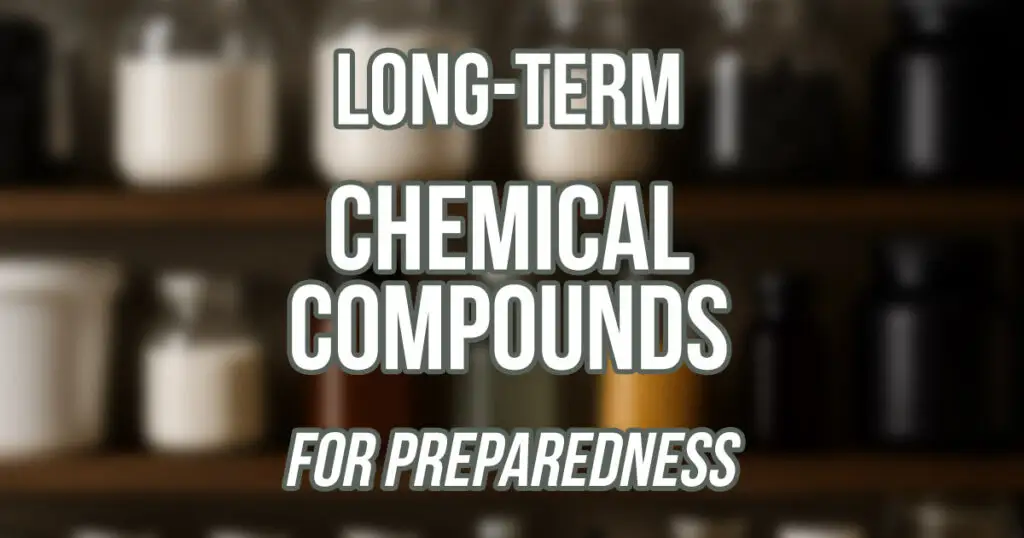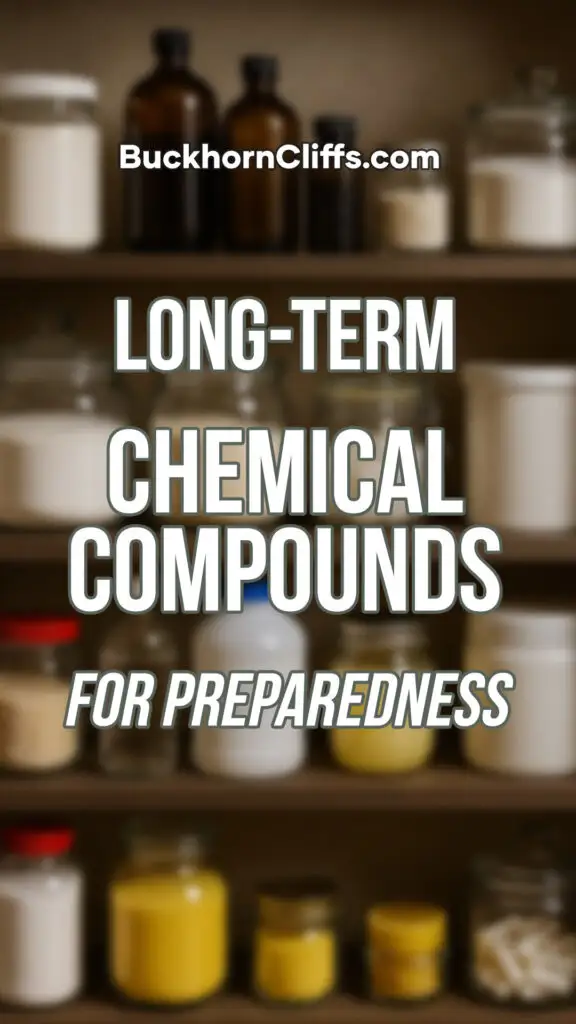In any well-rounded preparedness strategy, certain chemical compounds offer unmatched value. These are not medications or perishable supplies: they’re shelf-stable, versatile materials that solve problems ranging from water purification and sanitation to food preservation, first aid, pest control, and tool maintenance. This list includes only those compounds with proven long shelf lives, typically lasting a decade or indefinitely when stored correctly.

Whether you’re building a home preparedness kit, outfitting a homestead, or developing a self-managed insurance plan, these compounds form the chemical backbone of long-term resilience.
- Calcium Hypochlorite – 10+ years
- Lugol’s Iodine Solution – 3–5 years
- Activated Charcoal – Indefinite
- Calcium Hydroxide – Indefinite
- Baking Soda – Indefinite
- Glycerin – Indefinite
- Citric Acid – Indefinite
- Ascorbic Acid – 10 years
- Vinegar (White) – Indefinite
- Washing Soda (Sodium Carbonate) – Indefinite
- Borax – Indefinite
- CARDNL Electrolytes – 7–10+ years
- Diatomaceous Earth (Food Grade) – Indefinite
- Petroleum Jelly – Indefinite
- Lye (Sodium Hydroxide) – Indefinite
- Ethanol (or Everclear 95%) – Indefinite
- Camphor – Indefinite (if sealed)
- Beeswax – 10+ years or more
- Boric Acid – Indefinite
- Creatine (Monohydrate) – 5+ years
- Bentonite Clay – Indefinite
- Sulfur Powder – Indefinite
- Potassium Nitrate – Indefinite
- Sodium Nitrate – 10+ years
- Potassium Permanganate – Indefinite
- Paraffin Wax – Indefinite
- Castile Bar Soap – Indefinite
- Cornstarch – Indefinite
- Ethanol (Alcohol-Based) – Indefinite
Calcium Hypochlorite – 10+ years
Store in a glass jar with a gasket-sealed lid or a thick HDPE plastic container, then place inside a sealed plastic bucket. It must stay completely dry and isolated. Exposure to even small amounts of moisture or organics can cause dangerous reactions. Never store in Mylar, metal, cardboard, or thin plastic bags.
- Bleach Solution for Disinfecting Surfaces
- Water Purification Using Calcium Hypochlorite
- Disinfecting Cisterns or Water Barrels
Lugol’s Iodine Solution – 3–5 years
Store in a dark amber glass dropper bottle with a tight-fitting cap in a cool, dark, and dry location. Avoid all exposure to air, light, and heat. Do not store in plastic or metal, as it may degrade the solution or container over time.
- Antiseptic for Cuts, Wounds & Skin Infections
- Nuclear Radiation Protection
- Emergency Water Purification
Activated Charcoal – Indefinite
Store in an airtight glass jar in a dry, cool place. Keep it far from anything with odors or fumes, as it will absorb airborne contaminants and lose effectiveness. Moisture must be avoided entirely to maintain potency.
- Treatment for Poison Ingestion or Digestive Illness (Internal Use)
- Topical Poultice for Bites, Stings, and Infections
Calcium Hydroxide – Indefinite
Store in a tightly sealed glass jar or HDPE container in a dry, cool environment. Exposure to moisture will activate the compound, reducing effectiveness and shelf life. Label clearly and do not store near anything acidic or reactive.
- Long-Term Egg Storage (Water Glassing)
- Natural Pest Control & Sanitation
- Soil pH Adjustment
- Emergency Mortar or Plaster
Baking Soda – Indefinite
Store in a sealed glass jar or HDPE container in a dry space. Keep it away from strong odors, as it will absorb them. While it retains cleaning ability indefinitely, its leavening function may decline over very long periods.
Body and Health
- Natural Aid for Stomach and Systemic Acidity
- Muscle Recovery & Performance Support
- Relief for Chronic Inflammation and Joint Pain
- Natural Care for Teeth and Gums
- Field Scrub for Body Odor and Skin Cleanliness
- Natural Hair Cleaning Without Shampoo
- Soothing Foot Soaks for Odor and Itch Relief
- Natural Relief for Itching, Rashes, and Bites
- Natural Relief for Sunburn and Overexposure
- Temporary Relief for Urinary Discomfort and Irritation
- Alkaline Bath for Skin Relief and Recovery
- Oral Rinse for Canker Sores and Mouth Irritation
- Foot Powder for Moisture and Friction Control
Home and Shelter
- Natural Surface Cleaner & Scrub
- Unclogging and Deodorizing Drains
- Shelf-Stable Laundry Cleaning Formula
- Multi-Purpose Deodorizer for Enclosed Spaces and Surfaces
- Rodent Control Using Baking Soda Bait
- Emergency Fire Suppressant for Cooking Areas
- Low-Toxicity Pest Bait and Barrier for Insects
- Mattress, Fabric, and Upholstery Freshener
- Sanitizing Bedding or Sleeping Pads Without Washing
- Field Footwear Care: Deodorizing and Sanitizing Shoes Without Washing
- Alkaline Cleaning Paste for Heavy Residue Removal
Land and Environment
- Rodent Control Using Baking Soda Bait
- Chicken Coop Freshener Powder
- Low-Toxicity Pest Bait and Barrier for Insects
- Neutralizing Spills (Acidic Substances)
- Quick Test to Identify Soil Acidity or Alkalinity
Water and Food
- Improving Taste of Treated or Stored Water
- Leavening Agent for Cooking and Baking
- Neutralizing Acidity in Canned or Preserved Foods
- Washing and Disinfecting Produce
Glycerin – Indefinite
Store in a sealed glass or HDPE bottle in a cool, dark location. Keep the container tightly closed when not in use to prevent contamination. A pump top or dropper cap helps reduce unnecessary air exposure.
- Emergency Flame Reaction Without Heat or Friction
- Making a Tincture with Glycerin
- Skin Protectant and Moisturizer
Citric Acid – Indefinite
Store in an airtight glass jar or HDPE container in a dry place. Humidity causes clumping and can compromise shelf stability. Keep tightly sealed and protected from kitchen or pantry moisture.
- Citric Acid for Food Preservation
- Mineral Absorption Support
- Cleaning & Rust Removal w/ Citric Acid
- All-Purpose Surface Cleaner
Ascorbic Acid – 10 years
Store in an airtight glass jar or vacuum-sealed mylar with desiccant in a cool, dark place. Light, air, and humidity rapidly degrade potency, so minimize exposure. When properly sealed and stored away from heat, it may remain viable for up to a decade.
- Water Supplement and Vitamin C Source
- Fruit Leather Preservation Recipe
- Fruit and Vegetable Preservation
- Oil and Fat Preservation
Vinegar (White) – Indefinite
Store in the original sealed plastic bottle or transfer to a glass container with a plastic lid. Keep in a cool, dark cabinet. Metal caps will corrode over time, even if coated, and should not be used.
Home and Shelter
- Unclogging and Deodorizing Drains
- Washing and Disinfecting Produce
- All-Purpose Surface Cleaner
- Disinfecting and Descaling Kettles or Coffee Makers
- Rust Removal for Tools and Hardware
- Mold and Mildew Cleaner
- Insect Deterrent Spray (vinegar)
- Natural Deodorant or Fabric Freshener
Body and Health
Land and Environment
- Quick Test to Identify Soil Acidity or Alkalinity
- Weed Control and Pathway Maintenance
- Animal Pen and Coop Cleaner (vinegar)
- Insect Deterrent Spray (vinegar)
Storage and Preservation
- Battery Terminal Cleaner
- Disinfecting and Descaling Kettles or Coffee Makers
- Rust Removal for Tools and Hardware
- Animal Pen and Coop Cleaner (vinegar)
Washing Soda (Sodium Carbonate) – Indefinite
Store in a sealed plastic container or glass jar in a dry, temperate location. Exposure to air causes clumping and reduces effectiveness. Add a desiccant pack if needed in humid environments.
- Shelf-Stable Laundry Cleaning Formula
- Alkaline Cleaning Paste for Heavy Residue Removal
- Hot Degrease Soak for Kitchen + Shop
Borax – Indefinite
Store in a thick plastic container or glass jar with a secure lid in a dry, cool space. Avoid areas with moisture, as it can harden or degrade. Add a desiccant if necessary.
CARDNL Electrolytes – 7–10+ years
Store in original sealed container or transfer to a glass jar or Mylar pouch with a desiccant, then seal tightly. Keep cool and dry. This product is extremely shelf-stable when kept out of heat and moisture.
Diatomaceous Earth (Food Grade) – Indefinite
Store in a sealed plastic bucket with gasket lid or a glass jar. Must remain dry. Avoid bags or flimsy containers that could puncture or leak fine dust. Always label clearly to avoid misuse or inhalation.
Petroleum Jelly – Indefinite
Store in the original container or transfer to a glass jar with an airtight lid. Avoid introducing contaminants during use. Store in a cool, dark area away from heat or direct sunlight.
Lye (Sodium Hydroxide) – Indefinite
Store in a tightly sealed glass jar or HDPE container with a desiccant in a dry, cool place. Lye is extremely reactive with moisture, including humidity in the air, and must be sealed immediately after each use. Keep far from children, pets, and reactive materials.
Ethanol (or Everclear 95%) – Indefinite
Store in a sealed glass bottle in a cool, dark location. Always keep the cap tightly closed and store upright. Protect from flame or ignition sources. Tinted glass is ideal but not required if kept out of sunlight.
Camphor – Indefinite (if sealed)
Store in an airtight glass jar or rigid plastic container in a cool, dry place. Camphor sublimates when exposed to air or heat, so maintaining a completely sealed environment is critical. Vacuum sealing is a viable option.
- Camphor Blocks for Tool and Storage Protection
- Wax Gear Waterproofing
- Camphor Muscle Balm for Soreness
Beeswax – 10+ years or more
Store in blocks or pellets inside a sealed tin, glass jar, or heavy plastic container. Keep cool and out of direct sunlight to prevent softening or melting. Avoid contamination to preserve purity.
Boric Acid – Indefinite
Store in a sealed glass or thick plastic container with a tight-fitting lid. Must remain dry and stored away from food or moisture sources.
Creatine (Monohydrate) – 5+ years
Store in the original sealed container or transfer to a glass jar with desiccant. Keep in a cool, dry, and dark location. Creatine is stable well past expiration if kept away from humidity and air.
Bentonite Clay – Indefinite
Store in a sealed glass jar or food-safe plastic container. It must stay dry and uncontaminated. Exposure to moisture will reduce effectiveness and cause it to harden.
Sulfur Powder – Indefinite
Store in a tightly sealed glass jar or thick plastic container in a cool, dry location. Keep away from heat, ignition sources, and reactive chemicals. Do not store in metal.
Potassium Nitrate – Indefinite
Store in a sealed glass jar or heavy-duty plastic container in a dry, cool space away from combustibles. Keep tightly sealed to prevent clumping or moisture activation. Do not store near acids or flammable materials.
Sodium Nitrate – 10+ years
Store in a sealed glass jar or heavy-duty plastic container with a desiccant pack in a cool, dry location. It is highly hygroscopic and will absorb moisture from the air, leading to clumping and degradation. Do not store near acids, flammables, or reactive substances.
Potassium Permanganate – Indefinite
Store in a tightly sealed dark glass jar or double-layered plastic container in a dry, cool location. Exposure to light and humidity will cause degradation. Store separately from organics and flammable substances.
Paraffin Wax – Indefinite
Store in block or pellet form in a sealed tin, glass jar, or thick plastic container. Keep away from heat and direct sunlight. Maintain in a clean, dry place to prevent contamination and degradation.
Castile Bar Soap – Indefinite
Store in its original wrapper or transfer to a dry, breathable container such as a cardboard box or cloth-lined bin. Keep in a cool, dark, and well-ventilated space. Allow freshly made or soft bars to air-cure for several weeks before storage, as harder bars last significantly longer. Avoid plastic bags or sealed containers that trap moisture. Do not store near strong-smelling substances, as the soap can absorb odors over time. When kept dry and undisturbed, Castile soap remains usable for decades.
Cornstarch – Indefinite
Store in an airtight container in a cool, dry place away from heat and humidity. Cornstarch is highly absorbent and will clump or spoil if exposed to moisture. Always use clean, dry utensils to avoid contamination. When kept sealed and uncontaminated, it remains shelf-stable indefinitely. Avoid storing near strong-smelling substances, as it can absorb odors over time.
Ethanol (Alcohol-Based) – Indefinite
Store in sealed glass bottles, ideally amber or clear, in a cool, dark place away from heat and open flame. Ethanol is highly volatile and will evaporate if the seal is compromised. Food-grade ethanol, such as Everclear (95%) or Vodka (40–50%), does not expire and remains shelf-stable indefinitely when properly stored. Everclear provides the strongest extraction power and longest preservation, while Vodka is widely available and suitable for most tinctures. Only use ethanol labeled as food-grade or beverage alcohol. Industrial, denatured, or methanol-containing products are toxic and unsafe for consumption.
Pin it


Kim
Monday 12th of May 2025
Hello Rob. I am trying like heck to print most of these long term chemical uses you have available for print and my computer just refuses to complete the process to allow for printing. I'm so frustrated. Are you able to email any of this? I hate microsoft edge. I know it's whats interfering but I can't find away around it. Thank you!!!
Kim Stahlberg
Rob Benson
Tuesday 27th of May 2025
I'm working on a book to nicely highlight this information. I will update on social media. soon...